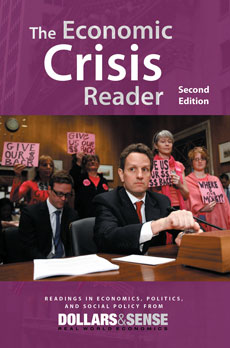The Economic Crisis Reader
Edited by Gerald Friedman, Fred Moseley, Chris Sturr, and the Dollars & Sense collective.

- Edition:
- 2nd
- Date of publication:
- November 2010
- ISBN:
- 978-1-878585-84-4
- Pages:
- 411
- Price:
- $34.95
The mainstream pundits tell us that “no one” anticipated the massive economic shocks of the past few years. The Economic Crisis Reader debunks that myth and many other misdiagnoses of the current crisis. With more than 60 well-researched, clearly written articles, this lively reader explains the causes, consequences, and possible solutions to the ongoing economic crisis. Chapters focus on the housing boom and bust, the financial meltdown, Fed policy, fiscal stimulus, the impact on workers, global dimensions, and more. The updated second edition includes the latest news and analysis, including thought-provoking ideas for reforming our economic system to prevent similar crises in the future.
Praise for The Economic Crisis Reader:
“The Economic Crisis Reader is another exceptional collection of essays about important subjects from the venerable Dollars & Sense. A first-class group of economists and journalists cover every aspect of the most severe economic collapse since the Great Depression: the causes of the crisis, the events leading up to it, its impact on working people and their responses to it, the ins-and-outs of financial markets, the U.S. government’s inadequate responses to the crisis, international dimensions, and numerous suggestions for the reforms of and more radical changes in our economic system that would avoid such crises in the future. Every chapter is clearly written, and even the most complex topics—from mortgage-backed securities and credit default swaps to the mechanics of monetary policy and the crowding-out effect—are made eminently comprehensible. This book should be used in every undergraduate economics class in every college in the world and in every worker-education course and study group. Teachers, including especially those who have been preaching economic orthodoxy, had better read it too!”
—MICHAEL YATES, author of The ABCs of the Economic Crisis: What Working People Need to Know and Associate Editor, Monthly Review
“This is distinguished public service. The Economic Crisis Reader brings together many short essays by those who were actually in the right as the crisis unfolded, as well as useful and accessible analysis from a left perspective. This effort is worth a truckload of recent mainstream journal articles.”
—JAMES K. GALBRAITH, Professor, LBJ School of Public Affairs, the University of Texas at Austin, and author of The Predator State: How Conservatives Abandoned the Free Market and Why Liberals Should Too
“My students absolutely loved The Economic Crisis Reader. It was adopted for the course titled "Economic Crisis" (300-level). Based on student evaluations, the course was a great success, and students commented that they really liked the selection of articles in the Crisis Reader. They even mentioned that they read many articles that weren't even assigned on the syllabus. Thanks for producing great books for our students!”
—ALLA SEMENOVA, Department of Economics, Dickinson College
“This is a book full of unexpected little jewels. Readers will find just the right fit. The range of themes and materials is all-encompassing. Every structural aspect of the dodgy, pillaging, rentier U.S. economy is explained, detailed, and assessed. To their credit, heterodox analysts—most particularly by the stalwart contributors to this impressive, timely collection—anticipated the current crisis....
“Talent seems to be in excess supply at Dollars & Sense: 30 authors, many well-known and the rest soon to be, take on the thorniest and often most abstruse issues. They do all this with aplomb, swift dispatch and, should we say, economy.
“This book will stand the test of time. It will be one of a small handful of classics revealing the savage rot of neoliberalism, the arrogant complacency of mainstream neoclassical economists, and the enabling contemporary economic policies at the Federal Reserve, the Treasury, and the Congress that have brought the U.S. to its current, ugly, impasse.”
—JAMES CYPHER, Research Professor, Doctoral Program in Development Studies, Universidad Autónoma de Zacatecas, Mexico
